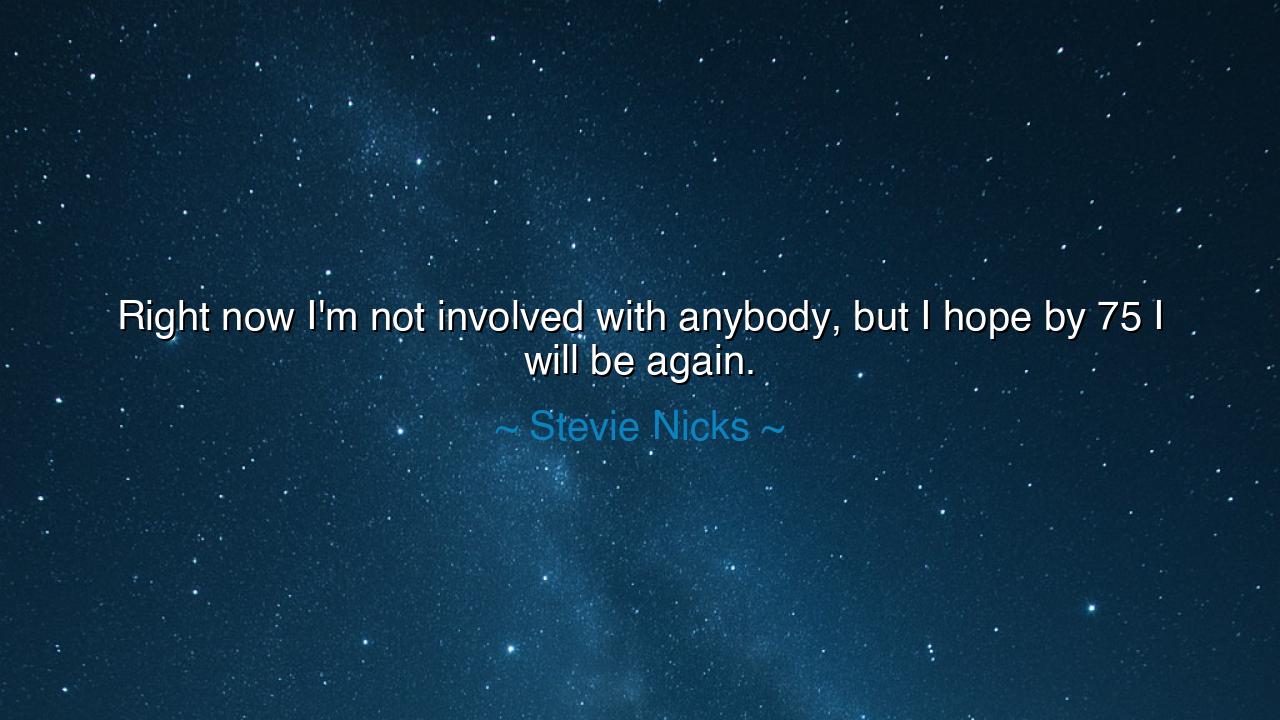
Right now I'm not involved with anybody, but I hope by 75 I will






“Right now I’m not involved with anybody, but I hope by 75 I will be again.”
Thus spoke Stevie Nicks, the poetess of rock and wind, whose voice has carried generations through love, loss, and longing. In this tender confession lies a truth as old as humankind: that the desire for love does not fade with time, and that hope, even in the twilight of life, remains one of the soul’s brightest fires. What she expresses is not mere wishfulness, but a declaration of faith in the enduring capacity of the human heart to renew itself, to bloom again after seasons of solitude.
The origin of these words springs from Nicks’ own life — a journey marked by fierce independence, great loves, and long stretches of solitude. As one of the most iconic musicians of her time, she lived in the glare of fame yet often spoke of the loneliness that comes with it. In saying these words, she reminds us that even amidst glory, what we seek most is connection. Her statement, half wistful and half defiant, rejects the notion that love belongs only to youth. Instead, she proclaims that age does not diminish the heart’s yearning; rather, it sharpens it, filling it with wisdom, patience, and grace.
There is an ancient beauty in this thought. For love, like the moon that waxes and wanes, is cyclical, not linear. The ancients believed that Eros, the spirit of love, visits every soul not once, but many times, changing form as we change. The love of youth is a flame — wild, consuming. But the love of age is an ember — steady, knowing, and warm. To hope for love at seventy-five, as Nicks does, is not to cling to the past, but to embrace the eternal rhythm of life, where every ending holds the promise of renewal.
Consider the story of Sophia Loren, the great Italian actress. After the death of her beloved husband, she spoke of how she thought love had ended for her. But as she grew older, she realized that love’s true form was not confined to romance — it could be found in friendship, art, and the devotion to life itself. She said, “Love never dies; it only changes its face.” Like Nicks, she too discovered that the longing to love and be loved is not a weakness, but the very pulse of human existence.
Nicks’ words also carry a deeper defiance against the silent tyranny of time. In a world that glorifies youth and fears aging, she dares to speak of hope beyond the bounds of years. She reminds us that the soul does not grow old, that beauty does not wither when seen through the eyes of tenderness. Her hope is not desperate — it is vital, a testament to the fact that life continues to offer gifts to those who remain open to receive them. To hope for love at seventy-five is to say: I am still alive, and I am still willing to feel.
Yet there is also a gentle humility in her voice. She does not demand love, she hopes for it. This difference is the mark of maturity. In youth, we chase love like a storm, desperate to possess it. In age, we open our hands and let it come like rain, grateful for its touch when it arrives. This kind of hope is not born of loneliness, but of wisdom — the understanding that love is not about filling an emptiness, but about sharing abundance.
So, O listener, take this lesson to heart: never let the flame of hope grow dim, no matter how many years life grants you. Love is not bound to youth, nor to beauty, nor to time — it belongs to those who still dare to feel deeply. Whether in romance, friendship, or the quiet communion of souls, love is the proof that life still flows through us. As Stevie Nicks reminds us, to hope for love, even at seventy-five, is to affirm that the spirit never dies. It is to stand before the universe and say, I am still here — still dreaming, still open, still alive.






AAdministratorAdministrator
Welcome, honored guests. Please leave a comment, we will respond soon